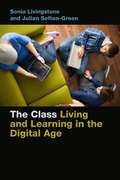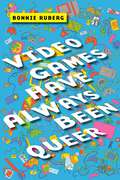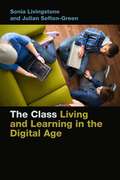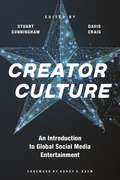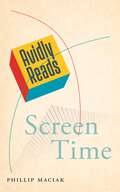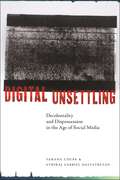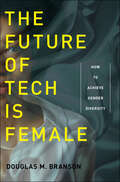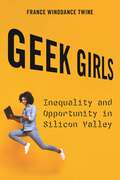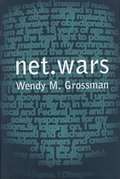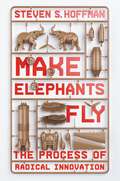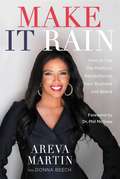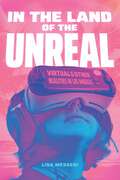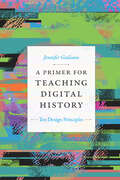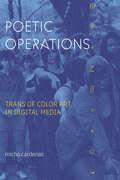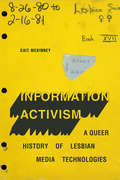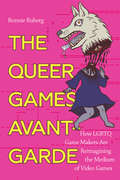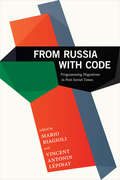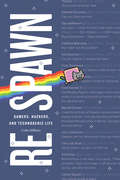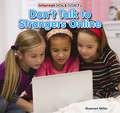- Table View
- List View
The Class: Living and Learning in the Digital Age (Connected Youth and Digital Futures #1)
by Sonia Livingstone Julian Sefton-GreenAn intimate look at how children network, identify, learn and grow in a connected world.Read Online at connectedyouth.nyupress.orgDo today’s youth have more opportunities than their parents? As they build their own social and digital networks, does that offer new routes to learning and friendship? How do they navigate the meaning of education in a digitally connected but fiercely competitive, highly individualized world?Based upon fieldwork at an ordinary London school, The Class examines young people's experiences of growing up and learning in a digital world. In this original and engaging study, Livingstone and Sefton-Green explore youth values, teenagers’ perspectives on their futures, and their tactics for facing the opportunities and challenges that lie ahead. The authors follow the students as they move across their different social worlds—in school, at home, and with their friends, engaging in a range of activities from video games to drama clubs and music lessons. By portraying the texture of the students’ everyday lives, The Class seeks to understand how the structures of social class and cultural capital shape the development of personal interests, relationships and autonomy. Providing insights into how young people’s social, digital, and learning networks enable or disempower them, Livingstone and Sefton-Green reveal that the experience of disconnections and blocked pathways is often more common than that of connections and new opportunities.
Video Games Have Always Been Queer (Postmillennial Pop #16)
by Bonnie RubergArgues for the queer potential of video games While popular discussions about queerness in video games often focus on big-name, mainstream games that feature LGBTQ characters, like Mass Effect or Dragon Age, Bonnie Ruberg pushes the concept of queerness in games beyond a matter of representation, exploring how video games can be played, interpreted, and designed queerly, whether or not they include overtly LGBTQ content. Video Games Have Always Been Queer argues that the medium of video games itself can—and should—be read queerly. In the first book dedicated to bridging game studies and queer theory, Ruberg resists the common, reductive narrative that games are only now becoming more diverse. Revealing what reading D. A. Miller can bring to the popular 2007 video game Portal, or what Eve Sedgwick offers Pong, Ruberg models the ways game worlds offer players the opportunity to explore queer experience, affect, and desire. As players attempt to 'pass' in Octodad or explore the pleasure of failure in Burnout: Revenge, Ruberg asserts that, even within a dominant gaming culture that has proved to be openly hostile to those perceived as different, queer people have always belonged in video games—because video games have, in fact, always been queer.
The Class: Living and Learning in the Digital Age (Connected Youth and Digital Futures #1)
by Julian Sefton-Green Sonia LivingstoneRead Online at connectedyouth.nyupress.org Do today's youth have more opportunities than their parents? As they build their own social and digital networks, does that offer new routes to learning and friendship? How do they navigate the meaning of education in a digitally connected but fiercely competitive, highly individualized world? Based upon fieldwork at an ordinary London school, The Class examines young people's experiences of growing up and learning in a digital world. In this original and engaging study, Livingstone and Sefton-Green explore youth values, teenagers' perspectives on their futures, and their tactics for facing the opportunities and challenges that lie ahead. The authors follow the students as they move across their different social worlds--in school, at home, and with their friends, engaging in a range of activities from video games to drama clubs and music lessons. By portraying the texture of the students' everyday lives, The Class seeks to understand how the structures of social class and cultural capital shape the development of personal interests, relationships and autonomy. Providing insights into how young people's social, digital, and learning networks enable or disempower them, Livingstone and Sefton-Green reveal that the experience of disconnections and blocked pathways is often more common than that of connections and new opportunities.
Creator Culture: An Introduction to Global Social Media Entertainment
by Stuart Cunningham David CraigExplores new perspectives on social media entertainmentThere is a new class of cultural producers—YouTube vloggers, Twitch gameplayers, Instagram influencers, TikTokers, Chinese wanghong, and others—who are part of a rapidly emerging and highly disruptive industry of monetized “user-generated” content. As this new wave of native social media entrepreneurs emerge, so do new formations of culture and the ways they are studied.In this volume, contributors draw on scholarship in media and communication studies, science and technology studies, and social media, Internet, and platform studies, in order to define this new field of study and the emergence of creator culture. Creator Culture introduces readers to new paradigms of social media entertainment from critical perspectives, demonstrating both relations to and differentiations from the well-established media forms and institutions traditionally within the scope of media studies.This volume does not seek to impose a uniform perspective; rather, the goal is to stimulate in-depth, globally-focused engagement with this burgeoning industry and establish a dynamic research agenda for scholars, teachers, and students, as well as creators and professionals across the media, communication, creative, and social media industries.Contributors include: Jean Burgess, Zoë Glatt, Sarah Banet-Weiser, Brent Luvaas, Carlos A. Scolari, Damián Fraticelli, José M. Tomasena, Junyi Lv, Hector Postigo, Brooke Erin Duffy, Megan Sawey, Jarrod Walzcer, Sangeet Kumar, Sriram Mohan, Aswin Punathambekar, Mohamed El Marzouki, Elaine Jing Zhao, Arturo Arriagada, Jeremy Shtern, Stephanie Hill
Avidly Reads Screen Time
by Phillip MaciakWhat happens when screen time is all the time?In the early 1990s, the phrase “screen time” emerged to scare parents about the dangers of too much TV for kids. Screen time was something to fret over, police, and judge in a low-grade moral panic. Now, “screen time” has become a metric not only for good parenting, but for our adult lives as well. There’s even an app for it! In the streaming era—and with streaming made nearly ubiquitous during COVID-19—almost every aspect of our day is mediated by these bright surfaces. Whether it was ever the real villain in the first place, or merely a convenient proxy for unaddressed familial, social, and institutional failures, screen time is now all the time.Avidly Reads Screen Time is a funny, insightful work of cultural criticism and history about how we define screens, and how they now define us. From Mad Men to iCarly, Vine to FaceTime, binge-watching to doom-scrolling, Phillip Maciak leads us on a sometimes heartwarming, sometimes harrowing tour of the media that brings us together and tears us apart.
Digital Unsettling: Decoloniality and Dispossession in the Age of Social Media (Critical Cultural Communication)
by Sahana Udupa Ethiraj Gabriel DattatreyanHow digital networks are positioned within the enduring structures of colonialityThe revolutionary aspirations that fueled decolonization circulated on paper—as pamphlets, leaflets, handbills, and brochures. Now—as evidenced by movements from the Arab Spring to Black Lives Matter—revolutions, protests, and political dissidence are profoundly shaped by information circulating through digital networks. Digital Unsettling is a critical exploration of digitalization that puts contemporary “decolonizing” movements into conversation with theorizations of digital communication. Sahana Udupa and Ethiraj Gabriel Dattatreyan interrogate the forms, forces, and processes that have reinforced neocolonial relations within contemporary digital environments, at a time when digital networks—and the agendas and actions they proffer—have unsettled entrenched hierarchies in unforeseen ways. Digital Unsettling examines events—the toppling of statues in the UK, the proliferation of #BLM activism globally, the rise of Hindu nationalists in North America, the trolling of academics, among others—and how they circulated online and across national boundaries. In doing so, Udupa and Dattatreyan demonstrate how the internet has become the key site for an invigorated anticolonial internationalism, but has simultaneously augmented conditions of racial hierarchy within nations, in the international order, and in the liminal spaces that shape human migration and the lives of those that are on the move. Digital Unsettling establishes a critical framework for placing digitalization within the longue durée of coloniality, while also revealing the complex ways in which the internet is entwined with persistent global calls for decolonization.
The Future of Tech Is Female: How to Achieve Gender Diversity
by Douglas M BransonAn accessible and timely guide to increasing female presence and leadership in tech companies Tech giants like Apple and Google are among the fastest growing companies in the world, leading innovations in design and development. The industry continues to see rapid growth, employing millions of people: in the US it is at the epicenter of the American economy. So why is it that only 5% of senior executives in the tech industry are female? Underrepresentation of women on boards of directors, in the C-suite, and as senior managers remains pervasive in this industry. As tech companies are plagued with high-profile claims of harassment and discrimination, and salary discrepancies for comparable work, one asks what prevents women from reaching management roles, and, more importantly, what can be done to fix it? The Future of Tech is Female considers the paradoxes involved in women’s ascent to leadership roles, suggesting industry-wide solutions to combat gender inequality. Drawing upon 15 years of experience in the field, Douglas M. Branson traces the history of women in the information technology industry in order to identify solutions for the issues facing women today. Branson explores a variety of solutions such as mandatory quota laws for female employment, pledge programs, and limitations on the H1-B VISA program, and grapples with the challenges facing women in IT from a range of perspectives. Branson unpacks the plethora of reasons women should hold leadership roles, both in and out of this industry, concluding with a call to reform attitudes toward women in one particular IT branch, the video and computer gaming field, a gateway to many STEM futures. An invaluable resource for anyone invested in gender equality in corporate governance, The Future of Tech is Female lays out the first steps toward a more diverse future for women in tech leadership
How to Play Video Games (User's Guides to Popular Culture #1)
by Nina B HuntemannForty original contributions on games and gaming culture What does Pokémon Go tell us about globalization? What does Tetris teach us about rules? Is feminism boosted or bashed by Kim Kardashian: Hollywood? How does BioShock Infinite help us navigate world-building? From arcades to Atari, and phone apps to virtual reality headsets, video games have been at the epicenter of our ever-evolving technological reality. Unlike other media technologies, video games demand engagement like no other, which begs the question—what is the role that video games play in our lives, from our homes, to our phones, and on global culture writ large? How to Play Video Games brings together forty original essays from today’s leading scholars on video game culture, writing about the games they know best and what they mean in broader social and cultural contexts. Read about avatars in Grand Theft Auto V, or music in The Legend of Zelda: Ocarina of Time. See how Age of Empires taught a generation about postcolonialism, and how Borderlands exposes the seedy underbelly of capitalism. These essays suggest that understanding video games in a critical context provides a new way to engage in contemporary culture. They are a must read for fans and students of the medium.
Geek Girls: Inequality and Opportunity in Silicon Valley
by France Winddance TwineAn inside account of gender and racial discrimination in the high-tech industryWhy is being a computer “geek” still perceived to be a masculine occupation? Why do men continue to greatly outnumber women in the high-technology industry? Since 2014, a growing number of employment discrimination lawsuits has called attention to a persistent pattern of gender discrimination in the tech world. Much has been written about the industry’s failure to adequately address gender and racial inequalities, yet rarely have we gotten an intimate look inside these companies. In Geek Girls, France Winddance Twine provides the first book by a sociologist that “lifts the Silicon veil” to provide firsthand accounts of inequality and opportunity in the tech ecosystem. This work draws on close to a hundred interviews with male and female technology workers of diverse racial, ethnic, and educational backgrounds who are currently employed at tech firms such as Apple, Facebook, Google, and Twitter, and at various start-ups in the San Francisco Bay area. Geek Girls captures what it is like to work as a technically skilled woman in Silicon Valley. With a sharp eye for detail and compelling testimonials from industry insiders, Twine shows how the technology industry remains rigged against women, and especially Black, Latinx, and Native American women from working class backgrounds. From recruitment and hiring practices that give priority to those with family, friends, and classmates employed in the industry, to social and educational segregation, to academic prestige hierarchies, Twine reveals how women are blocked from entering this industry. Women who do not belong to the dominant ethnic groups in the industry are denied employment opportunities, and even actively pushed out, despite their technical skills and qualifications. While the technology firms strongly embrace the rhetoric of diversity and oppose discrimination in the workplace, Twine argues that closed social networks and routine hiring practices described by employees reinforce the status quo and reproduce inequality. The myth of meritocracy and gender stereotypes operate in tandem to produce a culture where the use of race-, color-, and power-evasive language makes it difficult for individuals to name the micro-aggressions and forms of discrimination that they experience. Twine offers concrete insights into how the technology industry can address ongoing racial and gender disparities, create more transparency and empower women from underrepresented groups, who continued to be denied opportunities.
net.wars
by Wendy GrossmanFull text online version at www.nyupress.org/netwars. Who will rule cyberspace? And why should people care? Recently stories have appeared in a variety of news media, from the sensational to the staid, that portray the Internet as full of pornography, pedophilia, recipes for making bombs, lewd and lawless behavior, and copyright violators. And, for politicians eager for votes, or to people who have never strolled the electronic byways, regulating the Net seems as logical and sensible as making your kids wear seat belts. Forget freedom of speech: children can read this stuff. From the point of view of those on the Net, mass-media's representation of pornography on the Internet grossly overestimates the amount that is actually available, and these stories are based on studies that are at best flawed and at worst fraudulent. To netizens, the panic over the electronic availability of bomb-making recipes and other potentially dangerous material is groundless: the same material is readily available in public libraries. Out on the Net, it seems outrageous that people who have never really experienced it are in a position to regulate it. How then, should the lines be drawn in the grey area between cyberspace and the physical world? In net.wars, Wendy Grossman, a journalist who has covered the Net since 1992 for major publications such as Wired, The Guardian, and The Telegraph, assesses the battles that will define the future of this new venue. From the Church of Scientology's raids on Net users to netizens attempts to overthrow both the Communications Decency Act and the restrictions on the export of strong encryption, net.wars explains the issues and the background behind the headlines. Among the issues covered are net scams, class divisions on the net, privacy issues, the Communications Decency Act, women online, pornography, hackers and the computer underground, net criminals and sociopaths, and more.
Make Elephants Fly: The Process of Radical Innovation
by Steven S. HoffmanDrawing on examples of the hottest innovators in Silicon Valley, this step-by-step guide will show you how to develop, test and launch your impossibly big idea to success. Almost every major company today has made innovation its number one priority. Yet fewer than one in four executives believe their organizations are effective innovators. The pressure to innovate and the price paid for failure keeps rising, while most companies haven't progressed at all. They are still using the same antiquated techniques pioneered decades ago. This is why some of the biggest corporations in the world manage to lose entire markets to startups they've never heard of.In today's world, everyone will need to innovate to stay competitive. It doesn't matter if you're a startup founder, corporate executive, small business owner, freelancer or professional, there's a technology out there that's going to upend your industry. And if you aren't able to harness it to your advantage, someone else will. Innovation is no longer an option--it's the price of admission into the business world.Make Elephants Fly is designed to help you implement the same innovation methodologies and processes as Silicon Valley startups. It will teach you: How startups come up with breakthrough products and services. How to structure innovation teams. The best ways to identify and vet new ideas. What it takes to foster a culture of innovation. How to establish a process of innovation throughout your organization.By the time you've digested this book, you will have the tools needed to take your impossibly big idea and make it fly!
Make It Rain!: How To Use The Media To Revolutionize Your Business & Brand
by Areva Martin Donna Beech Phil McGrawWhat if you could get in front of millions of prospects with the avid endorsement of famous influencers--without spending a dime?It's happening right in front of you every day. Guest experts on TV, radio, podcasts, blogs, and live streaming are getting local and national exposure for their business and brand that they could never have afforded to reach with ads.For a decade, Areva Martin has used the media to build a huge platform that expanded the influence and power of her brand exponentially. Media appearances on Dr. Phil, Anderson Cooper 360, The Doctors, CNN, MSNBC, FOX, and more have virtually eliminated the need of a marketing budget for her thriving law firm and non-profit organization, while securing her place as one of America's most sought after thought leaders.In Make It Rain! Areva breaks the silence to reveal what insiders know about the power of media appearances to revolutionize a business and brand and get your core message out to the people who need it most. You'll learn how to: Match your brand to the right audience and media venues Craft pitches producers can't resist Jump on breaking news shows Pivot and speak in soundbites like the pros Amplify every interview with social media Turn appearances into platform and become a rainmakerNever before have there been more ways to build a presence that matters. Whether you are the executive of a corporation, the author of an upcoming book, the owner of a rapidly growing small business, or the public face of a local nonprofit or association, if you have a business to build or people you want to help, nothing beats using the media to create the visibility, influence, and power you need. Are you ready to Make It Rain!?
In the Land of the Unreal: Virtual and Other Realities in Los Angeles
by Lisa MesseriIn the mid-2010s, a passionate community of Los Angeles-based storytellers, media artists, and tech innovators formed around virtual reality (VR), believing that it could remedy society’s ills. Lisa Messeri offers an ethnographic exploration of this community, which conceptualized VR as an “empathy machine” that could provide glimpses into diverse social realities. She outlines how, in the aftermath of #MeToo, the backlash against Silicon Valley, and the turmoil of the Trump administration, it was imagined that VR—if led by women and other marginalized voices—could bring about a better world. Messeri delves into the fantasies that allowed this vision to flourish, exposing the paradox of attempting to use a singular VR experience to mend a fractured reality full of multiple, conflicting social truths. She theorizes this dynamic as unreal, noting how dreams of empathy collide with reality’s irreducibility to a “common” good. With In the Land of the Unreal, Messeri navigates the intersection of place, technology, and social change to show that technology alone cannot upend systemic forces attached to gender and race.
A Primer for Teaching Digital History: Ten Design Principles (Design Principles for Teaching History)
by Jennifer GuilianoA Primer for Teaching Digital History is a guide for college and high school teachers who are teaching digital history for the first time or for experienced teachers who want to reinvigorate their pedagogy. It can also serve those who are training future teachers to prepare their own syllabi, as well as teachers who want to incorporate digital history into their history courses. Offering design principles for approaching digital history that represent the possibilities that digital research and scholarship can take, Jennifer Guiliano outlines potential strategies and methods for building syllabi and curricula. Taking readers through the process of selecting data, identifying learning outcomes, and determining which tools students will use in the classroom, Guiliano outlines popular research methods including digital source criticism, text analysis, and visualization. She also discusses digital archives, exhibits, and collections as well as audiovisual and mixed-media narratives such as short documentaries, podcasts, and multimodal storytelling. Throughout, Guiliano illuminates how digital history can enhance understandings of not just what histories are told but how they are told and who has access to them.
Poetic Operations: Trans of Color Art in Digital Media (ASTERISK)
by micha cárdenasIn Poetic Operations artist and theorist micha cárdenas considers contemporary digital media, artwork, and poetry in order to articulate trans of color strategies for safety and survival. Drawing on decolonial theory, women of color feminism, media theory, and queer of color critique, cárdenas develops a method she calls algorithmic analysis. Understanding algorithms as sets of instructions designed to perform specific tasks (like a recipe), she breaks them into their component parts, called operations. By focusing on these operations, cárdenas identifies how trans and gender-non-conforming artists, especially artists of color, rewrite algorithms to counter violence and develop strategies for liberation. In her analyses of Giuseppe Campuzano's holographic art, Esdras Parra's and Kai Cheng Thom's poetry, Mattie Brice's digital games, Janelle Monáe's music videos, and her own artistic practice, cárdenas shows how algorithmic analysis provides new modes of understanding the complex processes of identity and oppression and the intersection of gender, sexuality, and race.
Information Activism: A Queer History of Lesbian Media Technologies (Sign, Storage, Transmission)
by Cait McKinneyFor decades, lesbian feminists across the United States and Canada have created information to build movements and survive in a world that doesn't want them. In Information Activism Cait McKinney traces how these women developed communication networks, databases, and digital archives that formed the foundation for their work. Often learning on the fly and using everything from index cards to computers, these activists brought people and their visions of justice together to organize, store, and provide access to information. Focusing on the transition from paper to digital-based archival techniques from the 1970s to the present, McKinney shows how media technologies animate the collective and unspectacular labor that sustains social movements, including their antiracist and trans-inclusive endeavors. By bringing sexuality studies to bear on media history, McKinney demonstrates how groups with precarious access to control over information create their own innovative and resourceful techniques for generating and sharing knowledge.
The Queer Games Avant-Garde: How LGBTQ Game Makers Are Reimagining the Medium of Video Games
by Bonnie RubergIn The Queer Games Avant-Garde, Bonnie Ruberg presents twenty interviews with twenty-two queer video game developers whose radical, experimental, vibrant, and deeply queer work is driving a momentous shift in the medium of video games. Speaking with insight and candor about their creative practices as well as their politics and passions, these influential and innovative game makers tell stories about their lives and inspirations, the challenges they face, and the ways they understand their places within the wider terrain of video game culture. Their insights go beyond typical conversations about LGBTQ representation in video games or how to improve “diversity” in digital media. Instead, they explore queer game-making practices, the politics of queer independent video games, how queerness can be expressed as an aesthetic practice, the influence of feminist art on their work, and the future of queer video games and technology. These engaging conversations offer a portrait of an influential community that is subverting and redefining the medium of video games by placing queerness front and center.Interviewees:Ryan Rose Aceae, Avery Alder, Jimmy Andrews, Santo Aveiro-Ojeda, Aevee Bee, Tonia B******, Mattie Brice, Nicky Case, Naomi Clark, Mo Cohen, Heather Flowers, Nina Freeman, Jerome Hagen, Kat Jones, Jess Marcotte, Andi McClure, Llaura McGee, Seanna Musgrave, Liz Ryerson, Elizabeth Sampat, Loren Schmidt, Sarah Schoemann, Dietrich Squinkifer, Kara Stone, Emilia Yang, Robert Yang
From Russia with Code: Programming Migrations in Post-Soviet Times
by Mario Biagioli Vincent Antonin LépinayWhile Russian computer scientists are notorious for their interference in the 2016 US presidential election, they are ubiquitous on Wall Street and coveted by international IT firms and often perceive themselves as the present manifestation of the past glory of Soviet scientific prowess. Drawing on over three hundred in-depth interviews, the contributors to From Russia with Code trace the practices, education, careers, networks, migrations, and lives of Russian IT professionals at home and abroad, showing how they function as key figures in the tense political and ideological environment of technological innovation in post-Soviet Russia. Among other topics, they analyze coders' creation of both transnational communities and local networks of political activists; Moscow's use of IT funding to control peripheral regions; brain drain and the experiences of coders living abroad in the United Kingdom, United States, Israel, and Finland; and the possible meanings of Russian computing systems in a heterogeneous nation and industry. Highlighting the centrality of computer scientists to post-Soviet economic mobilization in Russia, the contributors offer new insights into the difficulties through which a new entrepreneurial culture emerges in a rapidly changing world. Contributors. Irina Antoschyuk, Mario Biagioli, Ksenia Ermoshina, Marina Fedorova, Andrey Indukaev, Alina Kontareva, Diana Kurkovsky, Vincent Lépinay, Alexandra Masalskaya, Daria Savchenko, Liubava Shatokhina, Alexandra Simonova, Ksenia Tatarchenko, Zinaida Vasilyeva, Dimitrii Zhikharevich
Respawn: Gamers, Hackers, and Technogenic Life (Experimental Futures)
by Colin MilburnIn Respawn Colin Milburn examines the connections between video games, hacking, and science fiction that galvanize technological activism and technological communities. Discussing a wide range of games, from Portal and Final Fantasy VII to Super Mario Sunshine and Shadow of the Colossus, Milburn illustrates how they impact the lives of gamers and non-gamers alike. They also serve as resources for critique, resistance, and insurgency, offering a space for players and hacktivist groups such as Anonymous to challenge obstinate systems and experiment with alternative futures. Providing an essential walkthrough guide to our digital culture and its high-tech controversies, Milburn shows how games and playable media spawn new modes of engagement in a computerized world.
Smartphone Safety
by Eric MintonSmartphones offer convenience and fun, but it is important to use them safely. This title points out phone features that owners can use to make their smartphones more secure. It discusses how to safely find, download, and use apps. The connection between smartphones and cyberbullying is addressed. Information about what to do if you lose your phone or need to get rid of an old phone is included, too.
Don't Talk to Strangers Online (Internet Dos & Don'ts)
by Shannon MillerThis book briefs you on online safety and warns against talking to strangers online.
Don't Share Your Address Online (Internet Dos & Don'ts)
by Shannon MillerIt is smart to be safe online by keeping facts about yourself private. This book will tell you how.
Internet Dos and Don'ts: Keep Your Passwords Secret
by Shannon MillerPasswords are important personal information that should not be shared--not even with a best friend. Readers will learn why password privacy is key to their safety and the potential consequences of telling others confidential information.
Be Nice Online
by Shannon MillerNetiquette--being polite to others online--is a foundation of becoming a responsible Internet user. Readers will learn the basics of good online behavior as well as what to do if they encounter cyberbullies or other rude or abusive behavior. The lessons learned in this volume will provide readers with tools to develop digital citizenship.
Don't Share Your Phone Number Online (Internet Dos & Don'ts)
by Shannon MillerKeeping your phone number private is important to online safety. Readers will learn why they should not tell strangers their phone number and how to respond if they are asked for it.
